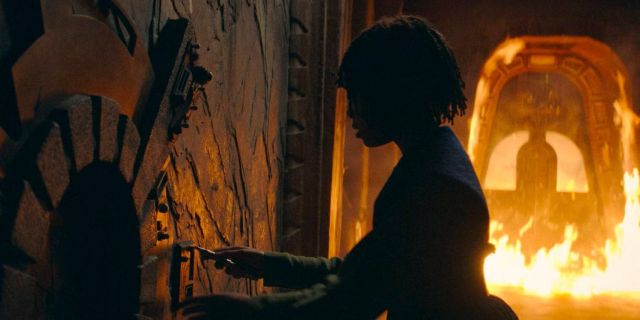The Acolyte is quickly proving to be one of the most controversial Star Wars shows ever made. While some percentage of the outrage is the expected hatred against the existence of anyone who isn’t white and male, other critiques find genuine problems with the series. Its narrative has a ton of strange choices, and eagle-eyed viewers have discovered bizarre problems. The latest episode attracted both love and hate, but a shocking chunk of the viewership refuses to acknowledge the possibility that it isn’t what it seems.
For all of its problems, The Acolyte is a unique Star Wars project. It isn’t dying the same boring death as most of Disney’s streaming efforts. The Book of Boba Fett is a waste of time because it doesn’t have any new ideas. Obi-Wan Kenobi feels ridiculous because it relies entirely on familiar material. The Acolyte finds new and interesting ways to challenge conventions and raise questions. It’s far from perfect, but at least it has new blood to spill when it makes a mistake.
The Acolyte is partially about perspective
|
Creator |
Leslye Headland |
|---|---|
|
Stars |
Amandla Stenberg, Lee Jung-jae, Charlie Barnett, Dafne Keen, Jodie Turner-Smith |
|
Episodes |
8 |
|
Release Date |
June 4, 2024 |
It’s fair to say that The Acolyte is about a lot of things. Its dialogue is often clunky and ham-fisted, leading to the unfortunate habit of characters blurting out central themes as if they expect viewers to miss something. It’s clear that one of the central themes is perspective. Characters have diametrically opposed beliefs with understandable justifications that simply can’t be simultaneously true. At one point, young Mae and Osha shout “The Jedi are bad” and “The Jedi are good” to punctuate their arguments. It’s perfectly reminiscent of Anakin announcing, “From my point of view, the Jedi are evil” in Revenge of the Sith. However poorly they get the point across, the idea of differing perspectives on shared information is central to the show. There’s a bizarre running thread of characters failing to acknowledge their opposition. Everyone seems utterly convinced of their side and completely unwilling to entertain alternative viewpoints. It’s the perfect condition for the unreliable narrator technique.
The Acolyte‘s story is incomplete

“Destiny” depicts the controversial events that unfolded on Brendok. Viewers learned about the fire that killed Osha’s family in the first episode, which also revealed Mae’s unexpected survival. Both Mae and Osha are shocked to see their sister alive in episode two. The follow-up sees Osha decide to leave the coven that raised her for the Jedi Order. Her mother reluctantly agrees, but Mae is less willing to concede. Suddenly, she takes several absurdly out-of-character actions. She lights the fire that kills her entire culture, almost including herself. Osha only escapes through the kindness of Jedi Master Sol, who is always the pinnacle of wisdom and kindness. Never mind that he insists on giving her a test for kids half her age, entices her with the promise of new friends, and moves to take her from her family once she passes.
Sol might have had to deal with some tough questions if Osha’s coven stuck around. It was certainly convenient that they all dropped dead, leaving only the one kid he wanted. It seems even more convenient when Mother Aniseya notes the Jedi’s long-term hatred of the witches. As Sol leads Osha through the disaster, they pass a pile of bodies that don’t seem burned. Details don’t add up, inconsistencies suggest nightmarish outcomes, and the flashback leaves a ton of unanswered questions. This isn’t a guarantee that the Jedi simply stormed into their enemy’s fortress, slaughtered them all, and took the one child they considered worthy of redemption. It is, however, a suggestion of that possibility. Fans will have to wait and see how much of this story turns out to be true.
Why don’t fans expect more information?

Far too many writers on the internet and fans on social media took this story at face value. Is this a failure of media literacy? Could everyone have simply assumed the worst? Are the foreshadowing details all there by accident? There’s no guarantee that The Acolyte will eventually deal with the theme that it promises. If it fails to deliver on that premise, it will deserve much of the criticism it’s earned. However, Leslye Headland cited Akira Kurosawa’s Rashomon as a central influence on the project. That classic is about multiple perspectives on a single, terrible event. The Last Jedi played with the same inspiration, using it as Kylo Ren’s central motivation. Perhaps the framing is to blame. There’s no element of suggestion in “Destiny.” The show simply depicts the events as if they’re occurring in any other episode. They never explicitly describe the idea of the episode as a subjective memory. For a show that tends to blurt things out, that’s a strange decision.
Perhaps all predictions are wrong, and The Acolyte just has a bizarre, inexplicably illogical backstory. However, it seems strange to see a story in this context and not assume that some of it will change in future episodes. If The Acolyte bails on the Rashomon format, it will struggle to tell the rest of its story. Disney only gave the first four episodes to critics, suggesting something worth hiding in the back half. Give The Acolyte a chance. It may still wind up a mess, but hear out the other side of this story.











Leave a Reply